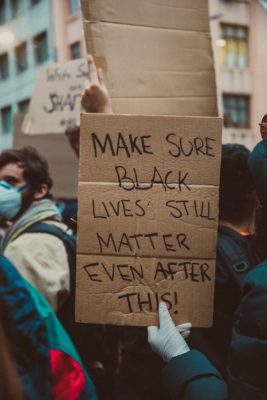As peaceful protests throughout the nation continue to encounter violence from police, Millennials and Generation Z have become all too familiar with the intricacies of our government and the way it does –or does not – protect its people. Many in these generations are outraged at how the federal government was quicker to go to war with peaceful protestors than it was to battle COVID-19.

Photo by Karimi Karagania. Courtesy of Unsplash.com
Millennials and Generation Z have gotten a bad rap in recent years. Detractors say they eat too much avocado toast, therefore they’ll never be able to buy houses. Or, that they are killing the diamond industry. One thing that Conservatives probably don’t want you to know is that Millennials and Gen Z are having conversations and pushing for change.
They are the ones out on the streets peacefully protesting. They are the ones signing petitions, donating to organizations and politicians. Perhaps this is why many were being scooped up randomly off the streets of Portland by unmarked soldiers in unmarked vehicles.
Social Media has become a platform for these generations to spread information. It recently has become a place where teenagers, as well as 20-and 30-somethings share information on the current socio and economic climate. Due to the treatment of protestors, not just in Portland but all across the country, the discussion has turned to fascism.
“Fascism is capitalist decay,” wrote Vladimir Lenin.
“Early warning signs of Fascism.” This social media post has been circulating through Instagram stories and posts. The warning sign was written by Laurence W. Britt in April of 2003, highlighting the common signs of fascism.
Britt compiled the list after researching seven fascist regimes including: Hitler’s Nazi Germany; Mussolini’s Italy; Franco’s Spain; Salazar’s Portugal; Papadopoulos’ Greece; Pinochet’s Chile and Suharto’s Indonesia.
The list states conditions such as:
- Powerful and continuing nationalism
- Disdain for human rights
- Identification of enemies as a unifying cause
- The supremacy of the military
- Rampant sexism
- Controlled mass media
- Obsession with national security
- Religion and government intertwined
- Corporate power protected
- Suppression of labor power
- Disdain for intellectuals and the arts
- Obsession with crime and punishment
- Rampant cronyism and corruption
- Fraudulent elections
This list is alarming. It has started many conversations among Millennials and Gen Z, mainly in its connection to what is currently happening in Portland and the potential for it to happen in other major cities across the country.
That perception has been furthered as we have witnessed the violent treatment of peaceful protesters in Aurora and the Jeep that came crashing through that crowd. If a vehicle hadn’t rammed into the Jeep causing damage and stopping it, the scene would have been much grimmer.
Highlighted among people’s concerns on social media is that the protester who tried to shoot out the tires to stop the Jeep (he ultimately missed the Jeep and injured three), was arrested. But the driver and passenger of the Jeep who terrorized the peaceful crowd have suffered no repercussions. In fact, the Aurora Police Department drove the occupants of the Jeep to the airport afterward.
The inequity is notable.
Millennials and Gen Z are finding their voices and using their social media platforms to enact change, spearhead knowledge and hold people accountable. President Donald Trump is clearly aware of this as he tried to blacklist the poplar TikTok app favored by this generation. With the way the tides are turning, Instagram may be next.







@david it’s shocking to see how many Chaffee County residents do not realize that Fascism is knocking on the door of this country.
You have drunk the Trump/Fox News kool-aid, my friend.
Thank you for being a voice of truth right now. It’s upsetting to see my fellow Americans glaze over all these warning signs of Fascism. Our democracy is withering. There are no opinions in this piece, only facts. President Donald Trump has tried to blacklist TikTok (this is the controlling of mass media). The 2016 election was fraudulent. These are facts. The facts speak for themselves and I really wish my fellow Americans saw that.
You lost me in the first sentence. Not all the protests are peaceful. This can be readily ascertained from a wide variety of media. I’m reading that the violent protestors are a small minority, sometimes right wing agitators. Whatever: the situation is far more complicated than you acknowledge—and that fact alone causes me to view your entire piece as biased and uninformed. It may be quite interesting, but again, to blithely simplify a complex issue at the beginning gives an impression of lack of rigor and honesty
Thank you for engaging Jim. We hear and respect your opinion. This piece was not meant to present one opinion but to introduce the mindset of a generation and it is based on several sources of the Gen Z and Millenial generation. The opinions used within it are from those who have asked to remain anonymous due to fear of backlash. Generation Z and Millennials think differently from other generations and this story explores both that mindset and the way they share information. It is time for other generations to understand this difference. Here at Ark Valley Voice, our reporters range from mid-twenties to more than 70 years old. Our conversation is always lively.
:Introduce a mindset” and publishing propaganda are the same thing in this article. It’s shocking, yet not surprising how so many radicals are lying about police interaction while stirring up hate, division and violence.